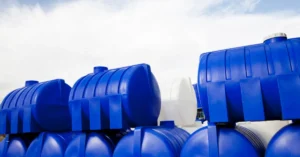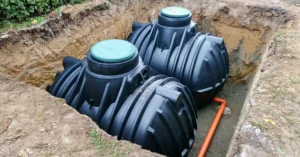Innovative Commercial Water Reservation Solutions for Cost and Compliance
Why Water Sustainability Is Non-Negotiable for Businesses
Water scarcity and climate change are placing increasing pressure on businesses to adopt sustainable practices. With climate-induced droughts and growing municipal restrictions, commercial properties are being called upon to lead the charge in water efficiency and conservation. Commercial buildings account for an estimated 17% of publicly supplied water use in the United States, according to the EPA.
Commercial water reservation, therefore, is more than a green gesture—it’s a business imperative. This approach, encompassing conservation, storage, recycling, and smart monitoring, offers a comprehensive pathway toward resource resilience and long-term savings. By implementing these strategies, commercial property owners can drastically reduce water bills, support environmental stewardship goals, and enhance their reputation as forward-thinking organizations.
According to the EPA WaterSense program, commercial and institutional buildings can save millions of gallons of water annually by implementing proven water efficiency practices. These savings not only benefit the environment but also translate into significant operational and financial advantages for businesses.
What Is Commercial Water Reservation?
Commercial water reservation refers to a suite of practices aimed at optimizing water usage, preventing waste, and integrating systems that allow for the collection, storage, and reuse of water in non-potable applications. This goes beyond simply reducing tap use—it involves a holistic assessment of where and how water is used within a commercial facility and implementing technologies and policies that make that usage more efficient.
Unlike residential water conservation efforts, which may focus on individual behavior changes, commercial water reservation requires system-wide strategies and investment in infrastructure. These may include:
Rainwater harvesting systems to collect and store runoff for irrigation or cooling towers.
Greywater recycling systems to treat water from sinks, showers, and laundry for reuse in toilet flushing or landscaping.
Smart meters and real-time monitoring systems to track consumption and detect leaks early.
Low-flow and WaterSense-certified fixtures to reduce usage at the point of consumption.
Industries that depend heavily on water, such as hospitality, healthcare, food processing, and manufacturing, stand to gain the most from implementing commercial water reservation strategies. A comprehensive study from the Water Research Foundation shows that effective implementation in commercial and institutional settings can reduce overall water consumption by up to 50%.
Benefits of Implementing Water Reservation Strategies
 Implementing water reservation systems in commercial buildings offers a range of benefits that extend far beyond simple cost savings:
Implementing water reservation systems in commercial buildings offers a range of benefits that extend far beyond simple cost savings:
Cost Savings: Reducing reliance on municipal water systems translates into immediate financial benefits. By minimizing waste, recycling water, and using efficient fixtures, companies can expect to see a 15–50% reduction in water bills. This range is supported by the American Water Works Association.
Regulatory Compliance: As local governments increasingly legislate water efficiency standards, having robust water reservation systems ensures that businesses stay ahead of compliance deadlines. For example, San Francisco requires large buildings to implement onsite water reuse systems as part of city ordinances.
Sustainability and ESG Performance: Investors and consumers are placing more value on companies with strong Environmental, Social, and Governance (ESG) credentials. Water efficiency is a key metric in green building certifications such as LEED, WELL, and ENERGY STAR.
Operational Resilience: During periods of water shortages or municipal service disruptions, businesses with internal water storage and recycling systems are better positioned to maintain operations without costly shutdowns.
Public Perception and Brand Value: Consumers and partners increasingly expect businesses to act responsibly toward the environment. Businesses that visibly engage in sustainability efforts often benefit from positive public relations and increased customer loyalty.
Technologies Driving Commercial Water Reservation
The backbone of any successful water reservation strategy is the integration of cutting-edge technology. Here are some of the leading solutions adopted by commercial facilities:
Rainwater Harvesting Systems: These systems collect rainwater from rooftops, which is then filtered and stored in tanks for non-potable applications such as irrigation, cooling systems, or toilet flushing.
Greywater Recycling Systems: These systems clean and redirect wastewater from sinks, showers, and laundry for reuse in landscaping or toilet flushing, reducing dependence on potable water supplies.
Smart Meters and IoT Monitoring: These tools enable real-time water usage tracking, allowing property managers to detect inefficiencies and leaks early. Systems like SmartFlow, Flume, and WaterSignal are widely used across industries.
Low-Flow Fixtures: EPA-certified WaterSense fixtures reduce water use by at least 20% without sacrificing performance.
Cooling Tower Optimization: Technologies that regulate blowdown frequency and reuse blowdown water are becoming critical in buildings with high cooling loads.
A study published in ScienceDirect highlights how smart water management systems contribute not just to conservation but also to improved operational intelligence through analytics.
Case Studies: Success Stories in Water Reservation
San Francisco’s On-Site Water Recycling Ordinance
The San Francisco Public Utilities Commission mandates water reuse systems in buildings over 250,000 square feet. Epic Cleantec is one of the pioneers in this space, installing closed-loop greywater systems that cut potable water usage by up to 30%.
EPA WaterSense Hotel Case Study
As documented in EPA WaterSense case studies, a major hotel chain replaced all plumbing fixtures with WaterSense models, launched a laundry reuse program, and improved landscape irrigation. These efforts saved over 3 million gallons annually and yielded $35,000 in cost reductions.
Marlboro, Massachusetts Water Efficiency Initiative
According to Massachusetts state records, four companies collaborated on water reservation strategies, including process redesign and greywater reuse. Collectively, they saved more than 10 million gallons per year.
Financial Incentives and Certification Programs
Implementing commercial water reservation practices can lead to various cost offsets and recognitions:
LEED v4.1 Water Efficiency Credits (USGBC): Points for reducing water use, installing sub-metering, and using non-potable water sources.
EPA WaterSense Rebates: Offered by many utility companies for fixture upgrades and irrigation controllers (Rebate Finder).
Section 179D Tax Deduction: Provides tax benefits for energy- and water-efficient building improvements.
State and Local Grants: Programs exist in states like California, Texas, and Massachusetts that offer grants or low-interest loans to commercial water savers.
A Business Case Rooted in Sustainability
 Commercial water reservation is no longer optional—it’s essential. From regulatory compliance and ESG improvement to operational efficiency and cost savings, the benefits are both tangible and far-reaching.
Commercial water reservation is no longer optional—it’s essential. From regulatory compliance and ESG improvement to operational efficiency and cost savings, the benefits are both tangible and far-reaching.
Businesses that take action now can secure a competitive edge while contributing to broader environmental goals. Whether it’s through simple retrofits or advanced closed-loop systems, commercial properties have much to gain from making water reservation a central part of their sustainability strategy.
Start today—schedule your commercial water audit and discover how smarter water management can transform your business.
FAQs
1. What is commercial water reservation and how does it differ from water conservation?
Commercial water reservation refers to the strategic use, storage, and reuse of water within commercial properties to minimize reliance on municipal supplies. While water conservation focuses on reducing water usage, water reservation encompasses broader practices such as rainwater harvesting, greywater recycling, smart metering, and on-site water reuse systems. It is a comprehensive approach aimed at long-term sustainability, compliance, and cost savings.
2. How much water can businesses save through commercial water reservation systems?
According to studies by the Water Research Foundation and EPA WaterSense, businesses can reduce water usage by 15% to 50% depending on the technologies and strategies implemented. For example, a hotel featured in an EPA case study saved over 3 million gallons of water annually just by upgrading fixtures and optimizing irrigation systems.
3. What types of buildings benefit most from commercial water reservation?
Industries and buildings with high water consumption stand to gain the most. These include:
Hotels and resorts
Hospitals and healthcare facilities
Food processing plants
Office complexes
Educational institutions
Commercial retail centers. In these settings, integrated water reuse systems, low-flow fixtures, and smart water management can deliver significant operational and financial benefits.
4. Are there financial incentives available for installing water reservation systems?
Yes, multiple incentives are available at the federal, state, and local levels. These include:
EPA WaterSense Rebates for certified fixtures (Rebate Finder Tool)
LEED credits for water efficiency under USGBC’s certification programs
Section 179D tax deductions for energy- and water-efficient building improvements
State and utility-sponsored grants or low-interest loans for water-saving upgrades
These programs significantly reduce the upfront investment and encourage faster ROI.
5. What are the first steps to implementing a commercial water reservation strategy?
The process generally begins with a comprehensive water audit to assess current usage and identify inefficiencies. After establishing water-saving goals, businesses should:
Install low-cost upgrades like WaterSense-certified fixtures.
Implement smart metering systems for real-time monitoring.
Explore larger investments such as rainwater harvesting or greywater reuse.
Educate staff and tenants to support sustainable practices.
Monitor results and optimize over time.
Tools like the EPA’s WaterSense Benchmarking Guide help streamline this process.
Partner with a Proven Leader in Commercial Building Excellence

Ready to integrate sustainable water reservation systems into your next commercial project? Whether you’re designing a new facility or upgrading an existing one, Iron Mechanical—California’s top-rated commercial builder—delivers unmatched expertise in developing high-performance infrastructure built for long-term success.
Our team specializes in advanced HVAC systems, energy-efficient mechanical design, and custom water conservation solutions tailored to your building’s unique needs. From concept to completion, we provide full-spectrum design, engineering, and project management services that meet the highest standards of quality, code compliance, and environmental sustainability.
At Iron Mechanical, we don’t just build structures—we engineer smarter, more resilient environments that reduce operational costs, optimize system performance, and support LEED and ESG goals.
Contact Iron Mechanical today to explore how our deep industry experience in HVAC integration, water-efficient systems, and sustainable construction can elevate your next commercial development.
Build smarter. Build with Iron Mechanical.
